The top 5 countries in Europe to get a job in 2022
The top 5 countries in Europe to get a job in 2022
Whether it’s wanting a fresh start from your current job or wanting to begin your post-graduate career abroad. Working in a European country can bring a huge number of advantages; everything from gaining better skills, working with people from different cultures, networking with a larger group of professionals or aiming to become more employable.
Of course, your employability will be much better if you first study in the country you want to work. Get free advice on where to study Business and Management in Europe.
Selecting the best country in Europe for job opportunities
The good news is there are many companies out there looking to employ foreigners to help make their establishments more efficient- enabling them to expand their businesses. They may prefer to employ individuals with a second language, especially if they have branches dotted across the globe. Whilst some countries offer larger salaries, others offer lower average working hours per week. Some may offer a better work-life balance and others, better cultural awareness. Each benefit is in itself so vast and extensive, but which European country has the most job opportunities?
top 5 countries in Europe to study and work
1. Germany
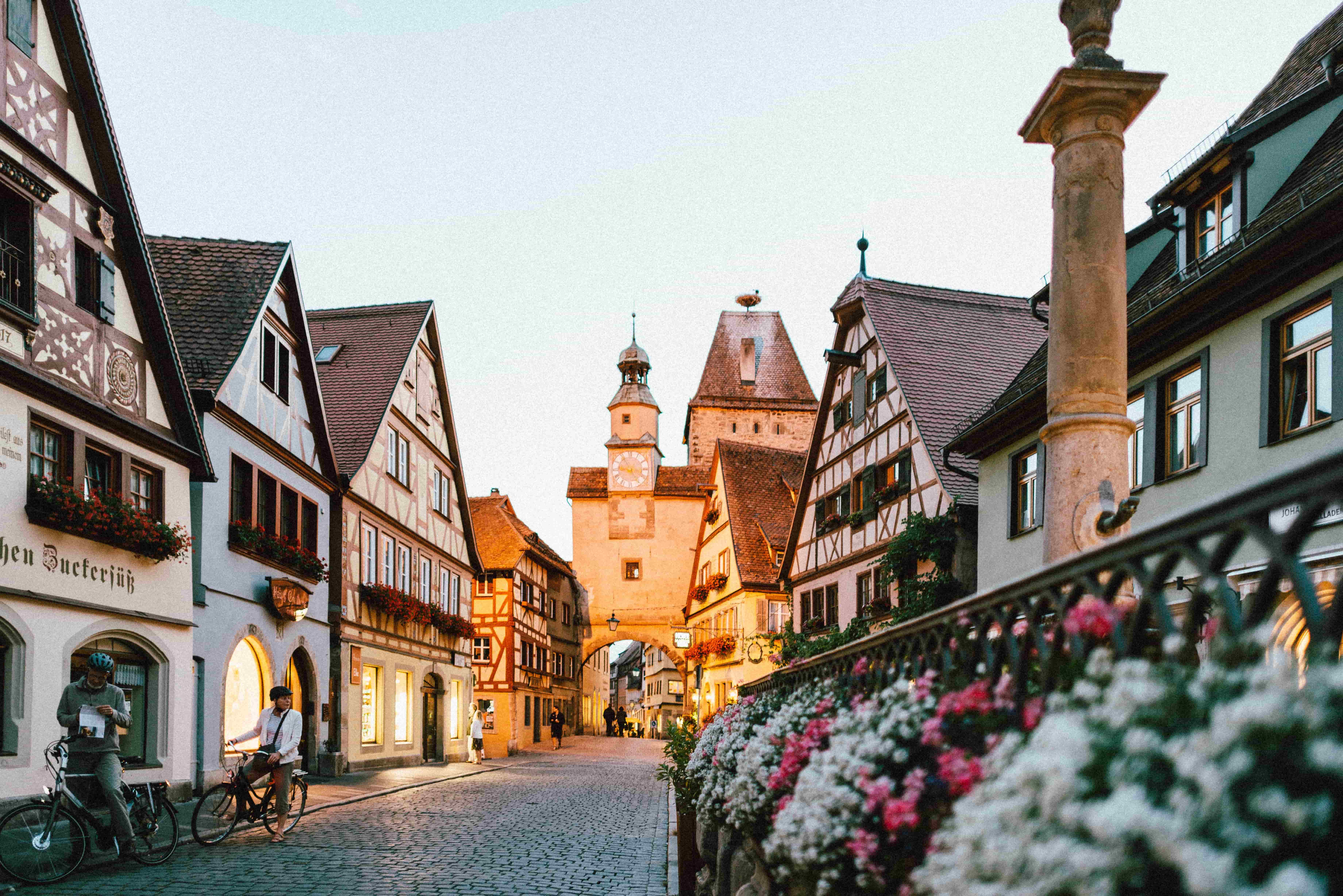
Germany has remained consistently at the top of many lists for the past three years, and rightly so. It sits at number 2 with one of the lowest unemployment rates in the whole of Europe, at 3.6% . Offers job security, great affordable housing, travel connectivity and safety. If you have vocational qualifications, plus some understanding of the German language, great news the chances of gaining employment are high for you. With chemicals (BASF), engineering (Volkswagen Group, BMW, Bosch), electronics (Siemens) and telecoms (Telekom) on the rise, job opportunities are looking good.
Germany currently has a shortage of healthcare, IT specialists and teachers, where annual salaries can go up to 70,000 Euros with a 38-hour working week.
Related:
2. The Netherlands
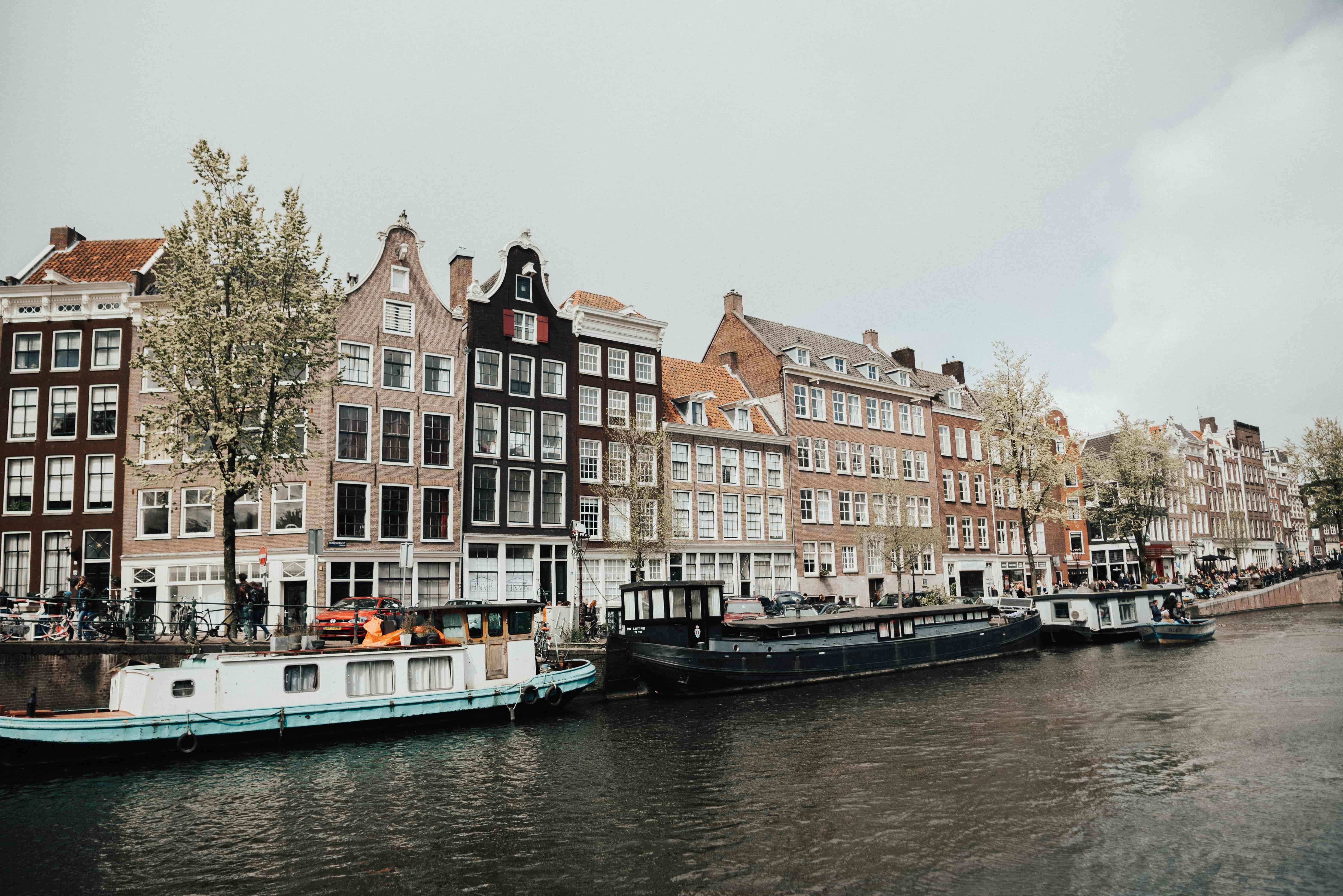
The Netherlands has one of the highest life expectancies, good quality water and air, high education standards and unemployment at only 4.4%. An increasingly large amount of the population can speak English and German with some even speaking Spanish and French , so communication shouldn’t be too much of a problem here
Its major cities, particularly Amsterdam, have proven that despite their relatively small size, the flourishing start-ups and inventive culture are what matters. The new start-up culture is giving young and excited entrepreneurs an opportunity to not only showcase their talents but also thrive, thanks to the backing of the government and its funding. Those of you who have recently graduated can even apply for temporary one-year contracts. Industries with shortages of professionals include scientific services, engineering, healthcare, business and teaching. Salaries average at roughly 56 000 Euros with a 40-hour working week .
Related:
3. Spain
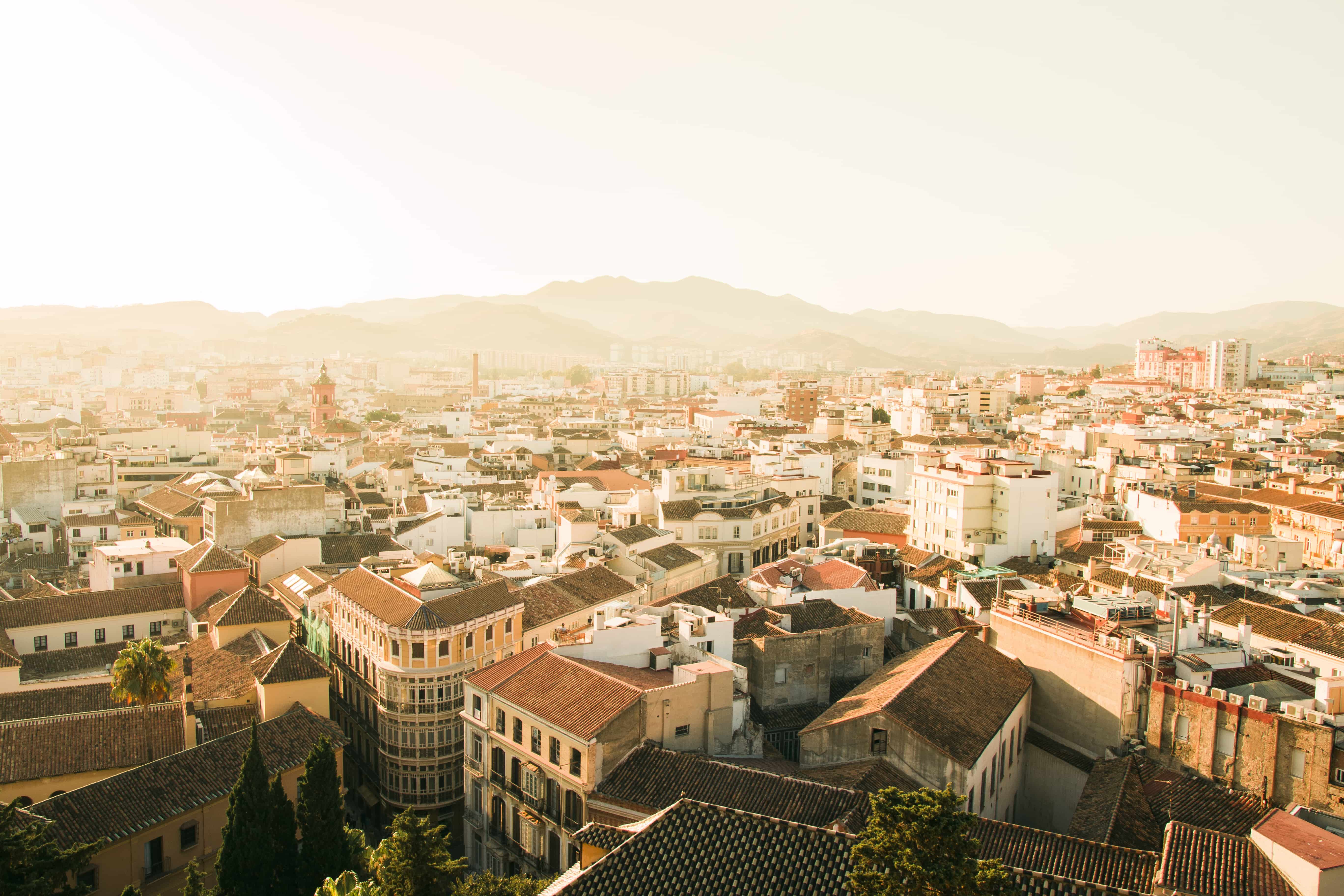
With its immaculate healthcare system and affordable living costs, Spain has scored the number one slot on numerous lists. Known for its friendly environment and eccentric culture. It is no wonder so many people opt for this, with its low cost of living, one could say you would even get more for your money. You just can’t go wrong with this beautiful destination.
However, we couldn’t give it the number one slot due to its slightly higher unemployment rate when compared to the others on this list, sitting at 16.7%. Many companies will prefer if you are fluent in Spanish, to ease and overcome the communication barrier between you and their customers. So do consider taking up Spanish, this is what could put you at the forefront of the race.
Spain has a large automotive industry and houses some of the major global pharmaceutical giants (GSK, Pfizer) and clothing companies (Inditex, Mango). They are experiencing a shortage in the IT sector and are eagerly seeking professionals to aid in this area. Offering roughly an average wage of around 45,000 Euros in a week of working to a maximum of 40 hours.
4. Norway
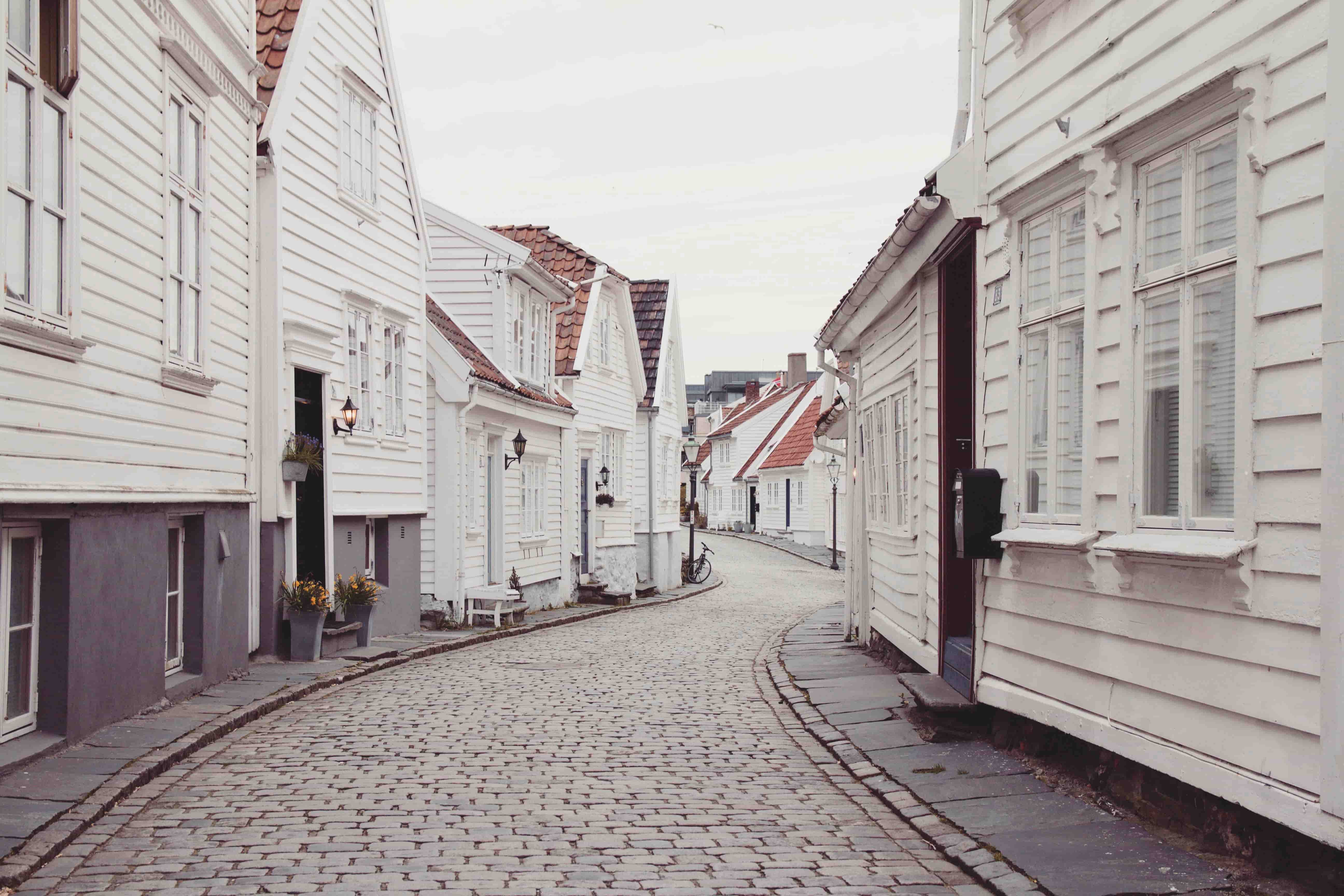
Despite not being an EU country we included Norway, as it is a member of the European Economic Area (EEA) and the Schengen passport-free zone. This, therefore, assures individuals from the country have the same freedom of movement rules as all the other EU member states.
Norway has been named the most prosperous country to live in due to its strong economy, whilst also being rated the best for a good work-life balance. It has even topped the UN human development index.
It is a country that offers great intercultural experience, short working weeks and an excellent healthcare system, plus mesmerising nature attractions.
Norway never shies away from adopting new technology and being innovative, therefore this country can offer a good income with great career prospects for the future.
Unemployment rates average at roughly 4.7% . Norway’s thriving industries include petroleum and gas (Statoil), fishing, finance (Nordea) and chemicals (Norsk Hydro). With construction, nursing and engineering industries are currently on the rise. Recently as an increasing amount of business is conducted in English, having a good knowledge of both written and spoken Norwegian –not necessarily fluent, provides better access to work opportunities. Salaries can go up to a whopping 65 000 Euros annually , with a 40-hour working week .
5. Switzerland
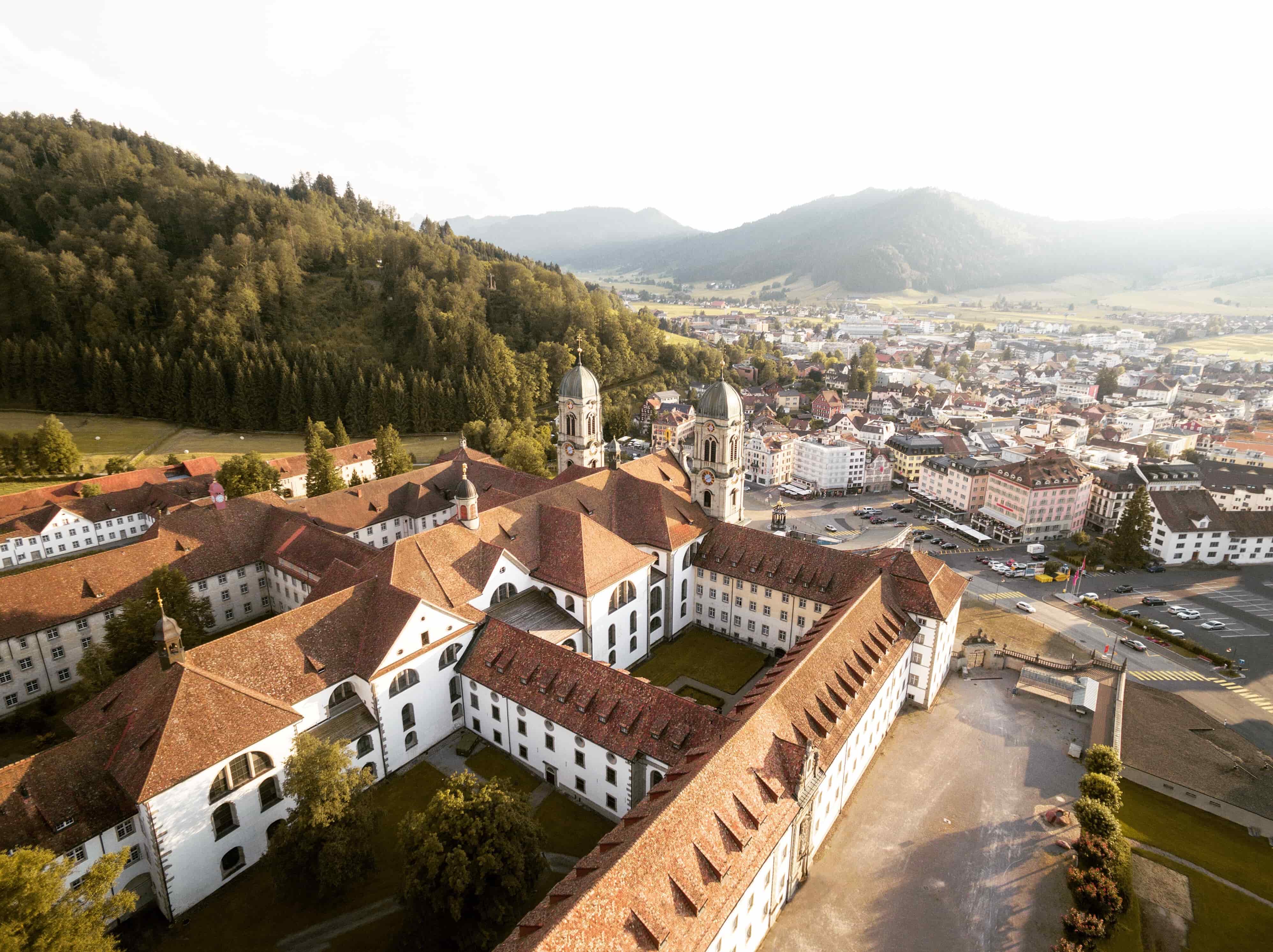
Switzerland like Norway is not part of the EU, but it hasn’t stopped EU citizens from dashing to this stunning country. It has been ranked number one in the HSBC list ‘for a career abroad’ . The country offers a brilliant balance combining both high earning prospects with a healthy lifestyle. Despite all this, we couldn’t score this lovely scenic country higher than the 5th slot and this is because of its rigorous and fierce competition. Partly due to its size but also because the workplace is saturated with well-educated and highly skilled professionals. This gives them a job unemployed rate of only 3.3%. However, this does not mean they aren’t willing to take foreigners on. In fact, there are opportunities for highly skilled graduates in areas such as engineering and technology (ABB), banking and financial services (Credit Suisse), and pharmaceuticals (Roche), even if you speak only English. With salaries almost double (even triple in some cases) than that of most European countries, an average salary could go up to a staggering 105 000 EUR per 45 hours a week.
Conclusion
That was our list of the top 5 countries in Europe to get a job. It is key to visit all the countries you are considering moving to, several times in order to make adjusting to the country a little easier. Compare living costs and try to make friends before you even get there. Apply for all the necessary documents your host country and employers will require, by checking your official government websites. Practising the language as often as you can, trust me you will thank yourself. The final and most important one is to get your health and malpractice insurance, this will save you a whole load of unnecessary hassle. Make sure you carry out all the relevant research and make the most educated decision based on that.
Related:
Editor’s note: This article was first published on the 21st of February 2018. We’ve updated it for current readers.
Statistics on migration to Europe

The share of foreign-born population in the EU is lower than in most high-income countries.
Foreign-born residents per country
Source: Eurostat, UNDESA, data from 2020
Note: non-EU born in case of the EU (i.e. those born in another Member State are not included); if intra-EU mobile persons were included, the share would be 12.4%
Reasons to stay in Europe
All valid residence permits at the end of 2021 by reason
Source: Eurostat; without Denmark; end of 2020 data in case of Croatia, Finland, Hungary and Ireland; “other” includes permits issued for the reason of residence only, permits issued to victims of trafficking of human beings and unaccompanied minors, as well as permits issued for all other reasons for which residence permits may be issued and which are not covered by the other categories
Among the non-EU citizens residing in the EU with a valid residence permit at the end of 2021, most were holding permits issued for family or work reasons.
Employment of immigrants
In 2021, 8.84 million non-EU citizens were employed in the EU labour market, out of 189.7 million persons aged from 20 to 64, corresponding to 4.7% of the total.
The employment rate in the EU in the working-age population is higher for EU citizens (74%), than for non-EU citizens (59.1%) in 2021.
Fact to consider: Many non-EU citizens are “essential workers”.
Over-represented sectors
In 2021, non-EU citizens were over-represented in some specific economic sectors such as:
| Sector | Overall employment of non-EU citizens | Overall employment of EU citizens |
|---|---|---|
| Accommodation and food service activities | 10.2% | 3.7% |
| Administrative and support service activities | 7.7% | 3.8% |
| Domestic work | 6.7% | 0.7% |
| Construction | 9.2% | 6.6% |
Over-representation by occupation
In terms of occupations, non-EU citizens were over-represented among:
Under-represented sectors
Non-EU citizens were under-represented in other economic sectors, including:
| Sector | Overall employment of non-EU citizens | Overall employment of EU citizens |
|---|---|---|
| Public administration and defence, compulsory social security | 1.3% | 7.5% |
| Education | 3.8% | 7.7% |
| Human health and social work activities | 8.3% | 11.3% |
| Professional, scientific and technical activities | 3.5% | 5.9% |
Under-representation by occupation
On the other hand, non-EU citizens were under-represented among:
| Occupational group | Overall employment of non-EU citizens | Overall employment of EU citizens |
|---|---|---|
| Teaching professionals | 2.4% | 5.6% |
| Business and administration associate professionals | 2.7% | 6.9% |
| General and keyboard clerks | 1.6% | 4.4% |
| Science and engineering associate professionals | 1.7% | 3.6% |
| Business and administration professionals | 2.2% | 4.4% |
| Health professionals | 1.4% | 3.1% |
Refugees in Europe
Refugees from Ukraine
Since Russia’s military aggression in Ukraine in February 2022, Europe has received the largest number of people fleeing war since World War II. For up-to-date details of the efforts to welcome people fleeing the war in Ukraine and to provide temporary protection, see the dedicated page Migration management: Welcoming refugees from Ukraine.
Overall situation at end of 2021
Based on data from UNHCR, at the end of 2021, all around the world there were:
Fact to consider: at the end of 2021, less than 10% of all the world’s refugees and only a fraction of internally displaced persons were living in the EU.
The share of refugees in the EU was 0.6% compared to its total population.
Number of refugees compared to total population
Several countries around the world host a large refugee population:
Source: UNHCR
Note: The graph shows the ten countries hosting the most refugees and the EU
Fact to consider: The majority of refugees from Africa and Asia do not come to Europe, but rather move to neighbouring countries.
Migration to and from the EU
Migration numbers in 2020
Fact to consider: Without migration, the European population would have shrunk by half a million in 2019, given that 4.2 million children were born and 4.7 million people died in the EU. In 2020, EU population shrunk by about 100 thousand people (from 447.3 million on 1 January 2020 to 447.2 million on 1 January 2021), due to a combination of less births, more deaths and less net migration.
In 2021, 2.95 million first residence permits were issued in the EU, compared to 2.3 million in 2020, reaching almost similar numbers as before the start of the COVID-19 pandemic (3.0 million in 2019). The decrease was driven by the travel restrictions introduced to curb the spread of the COVID-19 virus. The pandemic had a particularly strong negative impact on education-related permits and, as a result, their share decreased from 13% in 2019 to 11% in 2020. In 2021, there was a particularly large increase in case of work-related permits, the share of which grew from 39% in 2020 to 45% in 2021. In 2021, first permits were issued for the following reasons:
Source: Eurostat; “other” includes permits issued for the reason of residence only, permits issued to victims of trafficking of human beings and unaccompanied minors, as well as permits issued for all other reasons for which residence permits may be issued and which are not covered by the other categories
14 of the Most Underrated Places to Travel in Europe

London, Rome, Amsterdam… Europe is simply covered with world-famous tourism hotspots. But what if you want to go somewhere a little more original?
Luckily, there is a myriad of underappreciated and lesser-known travel destinations around Europe, still free of overcrowding and filled with surprises. I always love taking a chance on such alternative destinations, as they can charm you in such unexpected ways.
To highlight some of the underrated countries in Europe, we asked some of our favourite fellow bloggers to share their top picks — and to tell us what they love most about them.
Tbilisi, Georgia
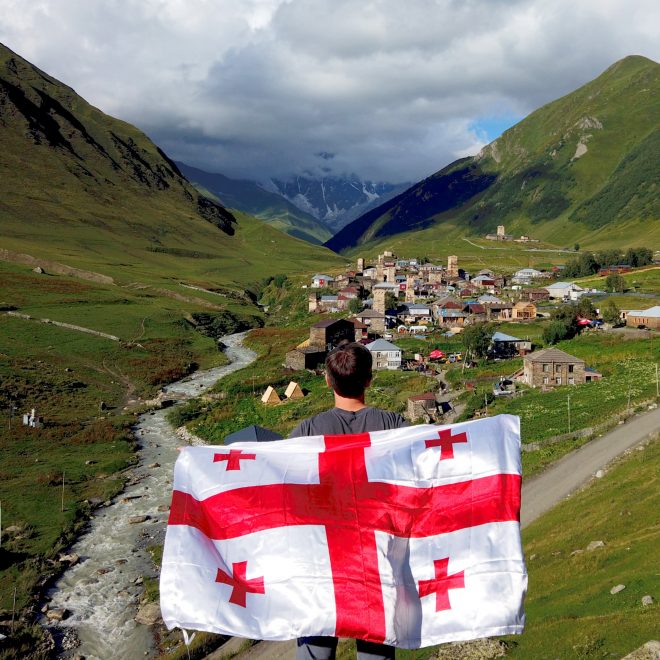
I’ve been to nearly 70 countries on my travels, and by far my favorite is the often-overlooked country of Georgia.
National Geographic recently called its capital, Tbilisi, “the World’s Most Bohemian City.” And, despite a recent influx of attention, Tbilisi remains a remarkable hidden gem.
“It’s like having a European-style vacation on a Southeast Asia vacation’s budget”
In Tbilisi, you’ll find a picturesque Old Town straddling a river and extending up a hillside underneath a 16th-century fortress. Wandering Tbilisi’s cobblestone streets, I often wondered why all those tourists are crowding places like Prague when this incredible city exists.
I particularly love that Tbilisi is such an easy city to navigate, thanks to an excellent and super affordable metro system and taxis that cost just a couple of Euros for a trip all the way across town.
In fact, Tbilisi’s remarkable affordability is a big part of the reason why it makes such a sensible alternative to Europe’s more touristed cities. It’s like having a European-style vacation on a Southeast Asia vacation’s budget!
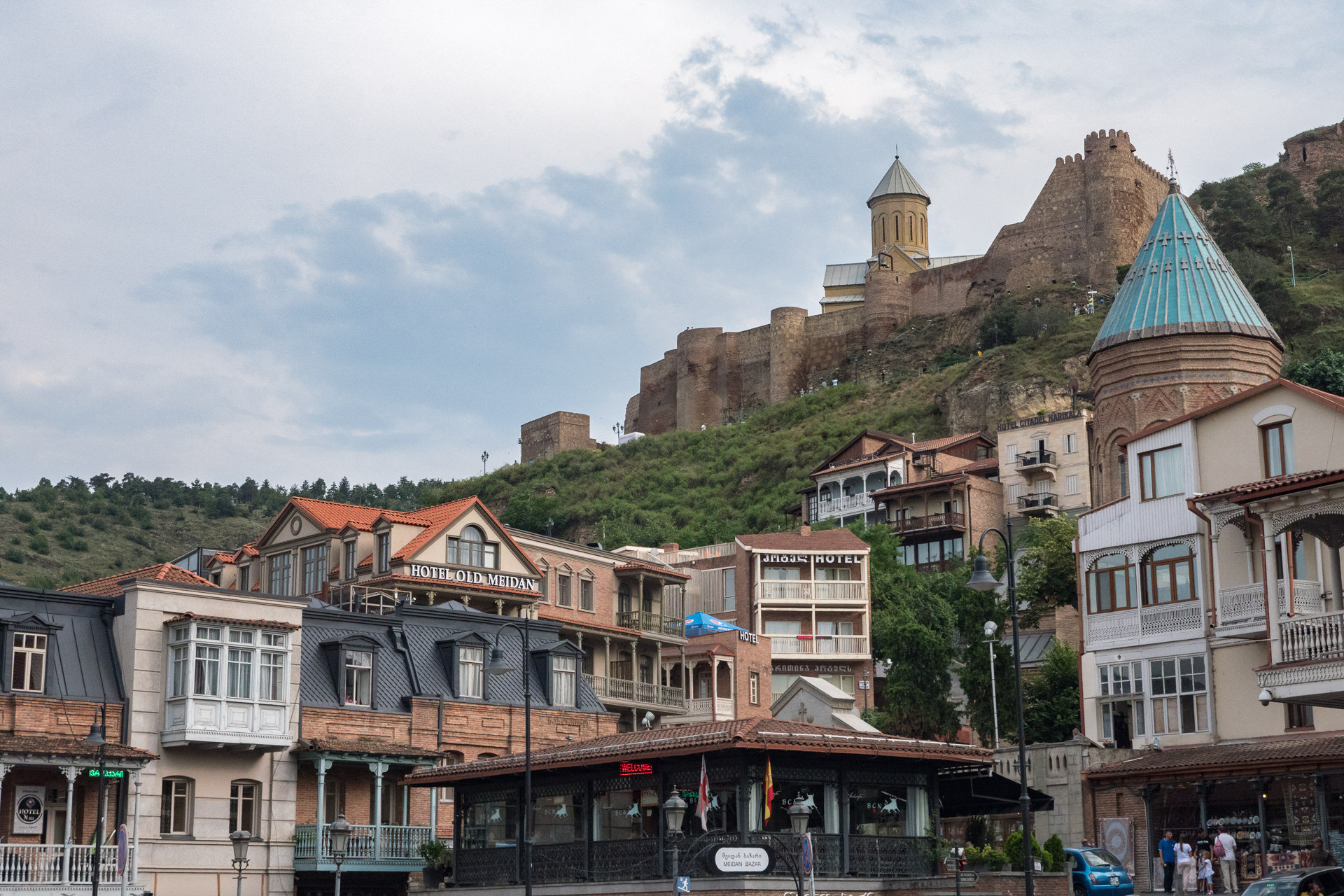
The one challenge I always had in Georgia is staying in shape, because Georgia is famous for its eclectic cuisine. Try the khachapuri, a Georgian cheese bread that’s like pizza only better (yes, really). And you’ll always have plenty of wine around to wash it down – in fact, wine was invented in Georgia, and to this day most local families make it in their basements.
Tbilisi also makes an excellent base to explore the many places to see in Georgia. From the mountains of Kazbegi to the ancient cave dwellings at Uplistsikhe, you’re unlikely to run out of things to do in Georgia. Here’s a secret tip most travelers don’t realize though: there’s a handful of short flights available from Tbilisi to the secluded region of Svaneti, Georgia. Snag one early in your trip planning to experience my favorite region of Georgia without braving the 9-hour winding mountain drive.
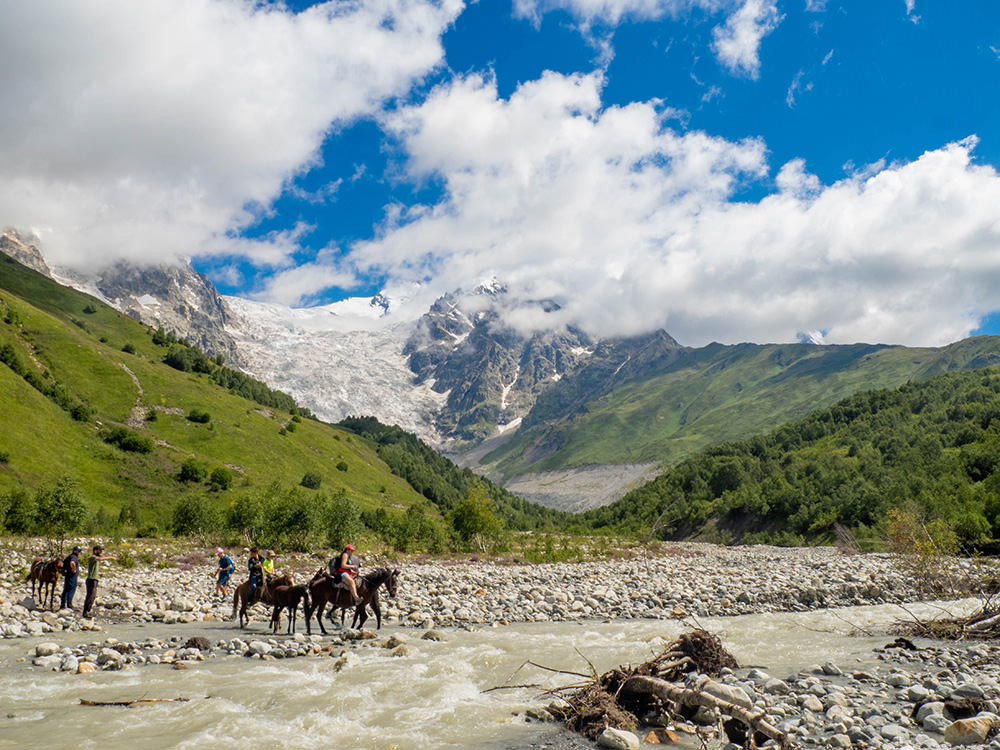
At the end of your time in Georgia, you’ll surely wonder why it’s not already uber-popular. With RyanAir opening up direct flights, that may be changing – so now is a great time to put Tbilisi on your travel list!
Brașov, Romania
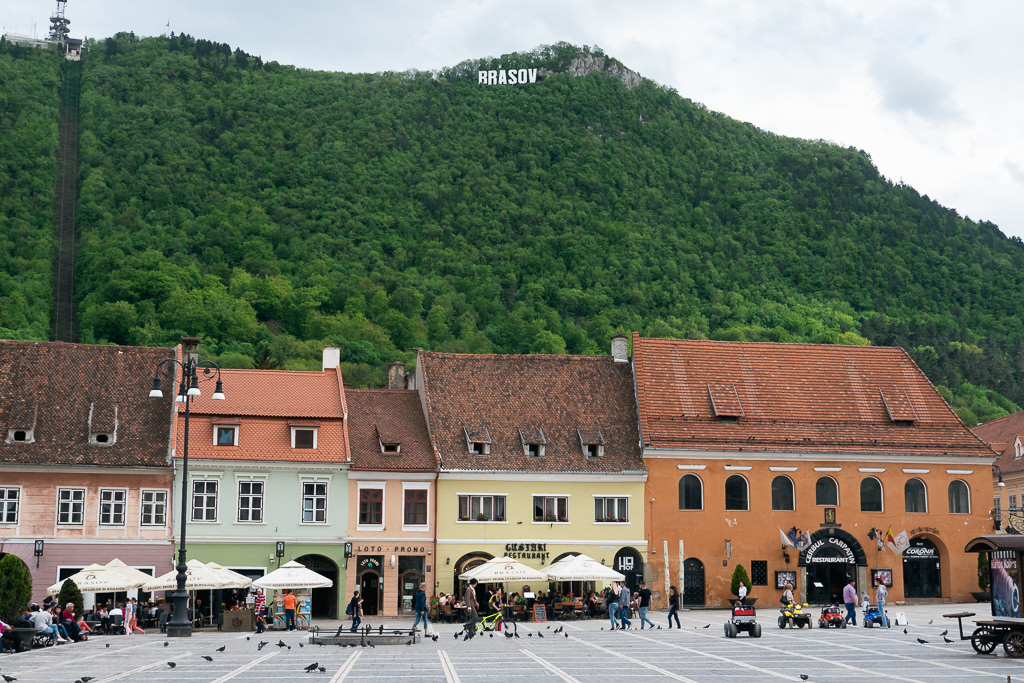
When I paid Romania a visit for the first time last year, it took me completely by surprise. While I consider Romania as a whole one of the most underrated countries in Europe, my favorite city must have been Brașov. As soon as I arrived, I already felt like I had to extend my stay there (and I did!). Some places just give you that magical first impression.
“I was delighted by the Medieval charm, colorful houses, and complete lack of overtourism”
The old town of Brașov lays between two forest-clad mountains, forming a wonderful green backdrop as you peek through its cobbled streets and alleys. Atop of one of these sits a Hollywood-like ‘BRASOV’ sign, which you can reach by a cable car for some amazing views of the city down below.
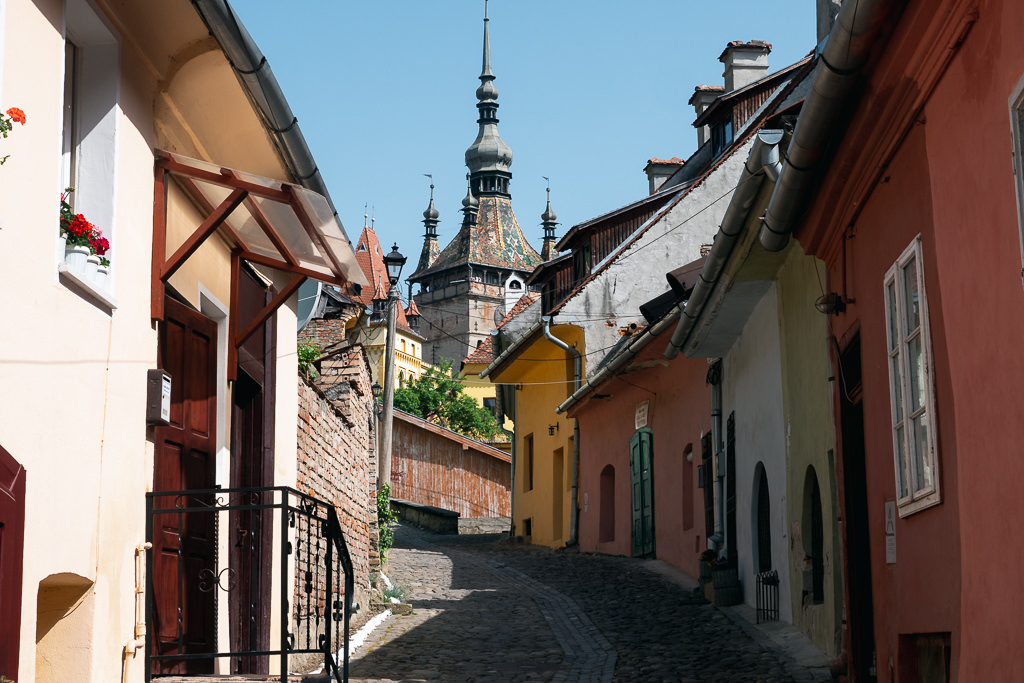
I was delighted by Brașov’s Medieval charm, colorful houses, fun bars and restaurants, and complete lack of overtourism. You can visit old city walls, castles, and fortresses in the area, go for day hikes, or simply stroll the cozy streets that are filled with life.
Despite having so much to offer, it’s very cheap to visit Brașov. You can find many stylish B&Bs and guesthouses for just 20 to 30 Euro a night, while a budget dinner might cost as little as 5 Euro. One night me and my girlfriend spent 20 Euro per person on a meal, which ended up being an exquisite multi-course feast that would have cost at least thrice that in Western Europe.
Go to Brașov (and to Romania!). You won’t be disappointed.
— Marek, Indie Traveller
Kiev, Ukraine
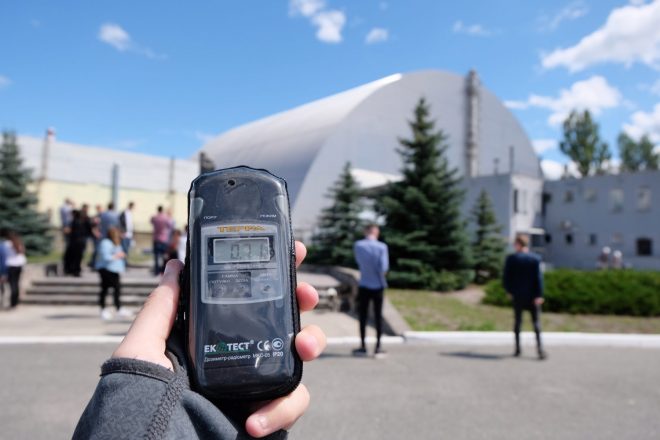
A surprising treat, Kiev, is in our opinion a seriously underrated European city.
The capital of Ukraine, Kiev has seen its fair share of challenges. Now however, the city’s history living behind the iron curtain of the former USSR just makes it all the more interesting.
“Incredibly affordable and off the well-worn tourist path, Kiev ticked a lot of boxes for us”
There you’ll find a real blend of architecture (everything from classical, Baroque, Art Nouveau, and socialist modernism), all sitting side by side along the wide streets that were once built for communist parades and to emphasize the grandness of their structures.
Those days are long gone but visitors now can enjoy this incredible nod to the past. With such remarkable buildings and incredible churches everywhere, simply walking around the streets of Kiev is a treat for your senses.
We came a little unstuck at the airport (when Nathan accidentally left our wallet on the plane) and though the customs officer was anything but helpful, we found the citizens of Kiev to be the exact opposite. As we walked around, trying to exchange the few US dollars that we had, each and every shopkeeper did everything they could to help – even with next to no English.
If you’re looking for an even more obvious step back in time, we suggest you join a day tour from Kiev and head out to Pripyat and Chernobyl, parts of Ukraine that we abandoned after that fateful day in 1986. It’s now safe to spend a small amount of time in the exclusion zone and doing so is both intriguing and eye-opening. Where else in the world can you find artifacts from the Soviet Union, untouched for over 30 years?
If you’re looking to visit a new city that is both intriguing and beautiful, you really can’t go part Kiev in Ukraine!
Malta
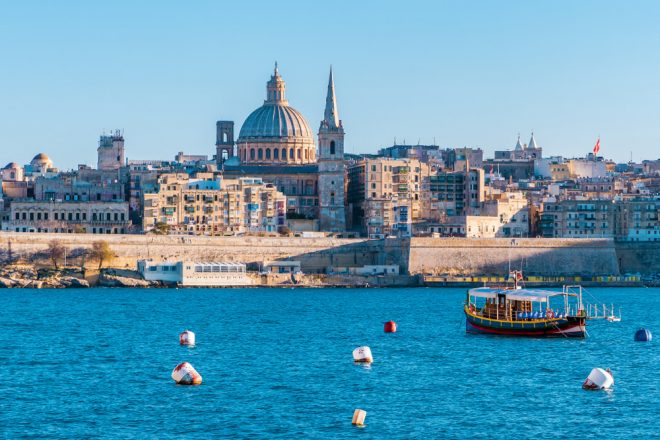
Malta is one of the most underrated countries in Europe, owing to its relatively obscure existence (at least for now). Tucked away far from the maddening crowds of the continent, Valletta—the country’s capital—offers a unique getaway for travelers looking for something different.
The main reason I wanted to go was two-fold: I knew nothing of the country and was curious, and I wanted to go somewhere warmer than Sweden (where I live).
“It’s small yet bursting with character. Medieval buildings, churches, cathedrals, and forts are crammed in beside one another”
The flight was cheap (another reason why I decided to go) and I admit I had low expectations at the outset. But I was actually quite enamored with the city once I arrived. It’s small yet it is bursting with character. Medieval buildings, churches, cathedrals, and forts are crammed in beside one another as narrow streets weave this way and that. The city itself is a little decrepit, which brings its history to life with clarity and texture.
Best of all, the city makes a great base for exploring the rest of the country. Day trips to Mdina (another historic destination) or to the beaches up north are easy to do via bus or car. And since the island was once annexed by Britain, almost 90% of the population speaks English, making it easy to navigate as a tourist.
There is some surprisingly good diving here as well, though for me, the draw is its eclectic past. Malta has been conquered by half a dozen nations throughout history, and all of those cultures simmer and stew together here.
I’ll admit, the food sucked from a vegan perspective, but the history, charm, and uniqueness more than made up for that.
Salzburg, Austria
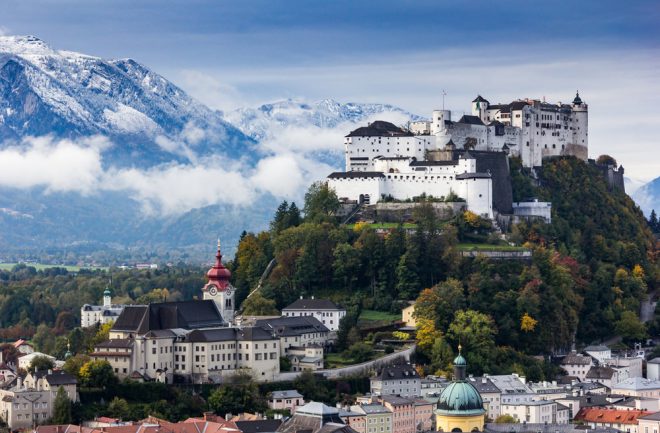
Salzburg a small little Austrian city on the border of Germany. Surrounded with beautiful views of the Eastern Alps and divided by the Salzach River, it is no wonder why you should pay a visit to this city full of medieval and baroque buildings.
The Altstadt, or Old City, is the birthplace of the famed composer Mozart. You’ll see Mozart’s influence everywhere around the city. When you walk around, don’t forget to try to have one of those famous Mozart Kügeln! To make sure you have the original one, have the silver wrapped, blue logo ball and not the red one.
Due to Mozart’s influence, you will find beautiful live music and talented musicians around every corner. You’ll often see music students rehearsing in the street, as well as violinists and harpists that fill the historical square with live music.
“No matter which season it is, Salzburg has something to offer”
Even if you aren’t into beautiful old cities, Salzburg is your place. With the Eastern Alps right at your doorstep, this is a popular place where locals like to go. If you want to go for a run, hike, bike or even ski in winter, Salzburg is the place to go.
This also means no matter which season it is, Salzburg has something to offer. Blooming flowers in Spring, or Weihnachts (Christmas) markets in winter!
If you aren’t convinced yet, just look at the pictures of the beautifully coloured houses and baroque buildings. Remember to always look up when you are in the city to admire those houses. If that isn’t enough, the city has some beautiful viewpoints as well.
On top of all this, Salzburg can also be romantic with its horse and carriage rides, or romantic pink sunsets. Those you’ll be able to view perfectly from the top of the Imberg Steps close to Kapuzinerberg Monastery.
What are you waiting for? Salzburg is ready to offer you everything you need for your next getaway!
Ljubljana, Slovenia
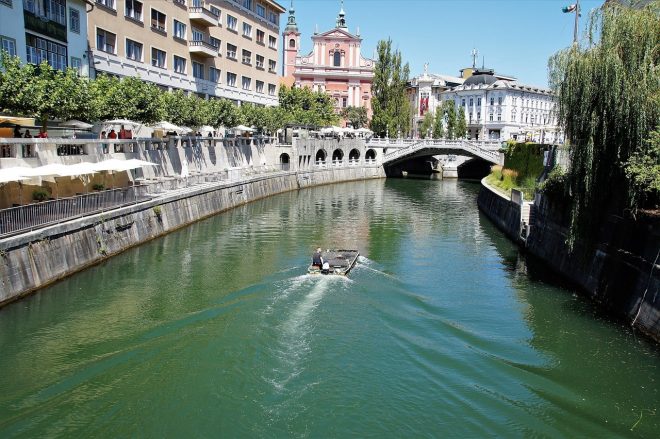
Ljubljana is the capital city we both love to visit each time we are in Slovenia. One of the reasons why we like this place so much, is because there are a number of things to do. Beautiful parks, charming streets and good vibes are around every corner. It’s also a very clean city with a car-free center, various lovely cafe bars, and restaurants.
The city is small with a population of about 280,000. Even so, it is lively and just big enough. What we both like – it can be easily seen in one day. It’s no surprise that it is called a European green city – it boasts nature in the heart of the city center and other urban green areas. Our favorite green spot is Tivoli park, which is the biggest park in the city and we highly recommend a visit there. It is a mixture of lawns, wooded areas, and playgrounds for kids. And if you are in a good physical condition, challenge yourself and hike Šmarna gora – this is a place of spectacular views!
“Beautiful parks, charming streets and good vibes are around every corner”
The heart of the city center is marked by the work of the world-renowned architect Jože Plečnik. His famous works are three bridges forming the Triple Bridge in the city center, the National and University Library, and the Ljubljanica river embankments and bridges.
Prešeren Square is also located in the city center, named after the Slovenain poet France Prešeren. Here you can find a monument of the poet and the Fraciscan Church next to it.
If you cross the Triple Bridge, you’ll find the Central Market which is worth it to shop at, as the food here is fresh from local farmers!
There is also the Dragon Bridge, which is a symbol of the city. Additionally, the Metelkova Alternative Culture Center and the Ljubljana Castle shouldn’t be missed! The castle is the main attraction of the city, as well as our favorite spot in Ljubljana. You can reach it by funicular railway, but we both preferred walking uphill. The castle offers spectacular view of Ljubljana and its surroundings, and it’s a perfect way to finish off your trip!
— Leo and Neža, Safari Nomad
Tromsø, Norway
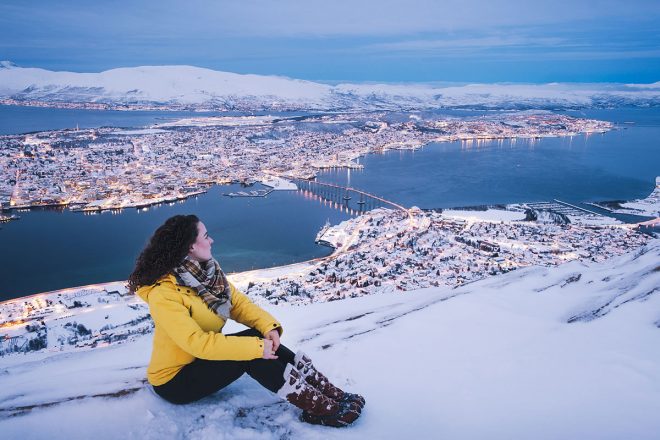
Located at the top of Norway some 350 km above the Arctic Circle, Tromsø would my top pick if you’re looking to travel to a lesser-known location that is truly special. There is so much to see and do in Tromsø which is why I’ve chosen to spend celebrate Christmas and my birthday there twice!
Tromsø (pronounced “trom-seh”) is absolutely stunning, especially in winter when its jagged peaks are covered in snow. In fact, it’s even nicknamed “Paris of the North.”
“Tromsø is the best place in the world to see the Northern Lights”
The best time to visit Tromsø is during winter when numerous special and unique experiences become available. Thanks to its location, Tromsø is the best place in the world to see the Northern Lights. Even the weakest Aurora Borealis activity can be seen here. It’s an indescribable feeling watching Mother Nature’s greatest light show which is why I highly recommend you experience it at least once.
Located in this part of the world are the Sámi – the northernmost indigenous people of Europe who have inhabited this region for roughly 5,000 years! During wintertime, you can meet a reindeer-herding Sámi family by joining their Sámi experience tour. They run these experiences in an effort to educate visitors about their people. You’ll cozy up around a warm fire inside a lavvu (a traditional Sámi tent) and learn about how the Sámi live off the land, their customs, and culture. Plus, you even get a chance to feed their gorgeous reindeer.
Tromsø has some of the most beautiful and dramatic landscapes I’ve ever seen. To see them, I joined this wonderful Arctic Fjord excursion where you get a chance to walk on a frozen lake, visit picturesque villages in huge valleys, marvel at beautiful fjords then end the day by enjoying a fire-side lunch in the snow – a magical moment you won’t easily forget.
It was all these experiences that convinced me to learn Norwegian, just so I could experience this incredible city and country even deeper. If you travel Tromsø or Norway, take my free Norwegian travel phrase guide with you. God tur! (Have a great trip!)
Nerja, Spain
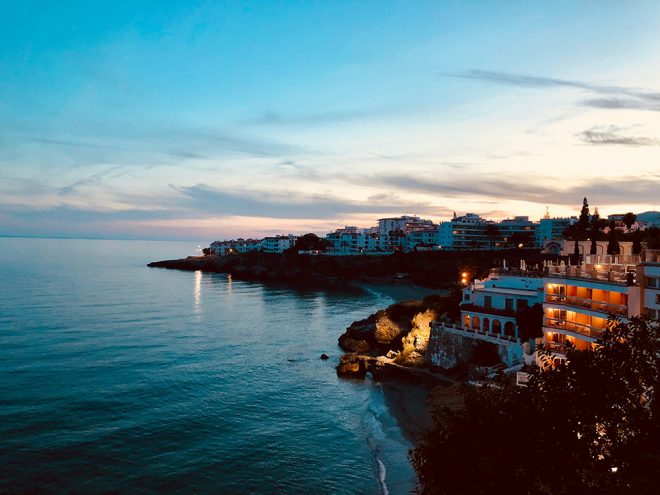
With family based in the region and a love for Spanish culture, I’ve been visiting Nerja for several years now. Every time I leave, I can’t wait to return again. Situated along Spain’s stunning, Southern coast, Nerja is a town characterised by traditional Andalucían food – one of the best climates in the world with a range of things to see and do.
With records dating back to the 8th Century, Nerja, as with much of Andalucía, has an incredibly rich and important history, influenced by Moorish culture during their 800 year rule until the 15th Century. Some of the region’s greatest architectural attractions, such as Granada’s Alhambra and Cordoba’s Mezquita, date back to this time and are all within driving distance of Nerja.
“A bustling centre of Spanish life, a melting pot of locals, holidaying Spaniards, and international tourists”
Nowadays, the small town has become a bustling centre of Spanish life, a melting pot of locals, holidaying Spaniards, and international tourists. The amazing climate of the Costa del Sol means that a visit anytime between March and November can result in warm sunny days. These shoulder months are a great time to visit when the town is quieter, though the hot summer months are always packed full of fun of course.
There are plenty of things to see and do in Nerja, but just wandering the streets in search of one of the many fabulous tapas bars is my absolute favourite thing to do. For those visiting for the first time, I would certainly recommend a visit to the Caves of Nerja, one of the most impressive cave structures in the region. Burriana Beach is the most popular beach, and it’s easy to see why! Surrounded by plenty of bars and shops, the blue-flag beach offers a range of water sports for the daring, or a beautiful place to walk and relax for those less inclined. Following the narrow streets of the town towards the coast will inevitably lead you to the Balcón de Europa, the central hub of Nerja life. It’s the perfect place to relax, grab a beer, and spend the afternoon people-watching.
Mons, Belgium
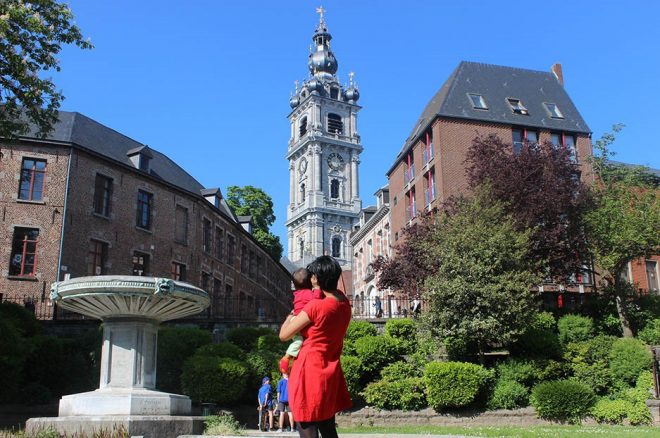
Mons is a tiny little gem in Belgium that surprised me in many, many ways. The main reason I went there was because it is surrounded by several UNESCO World Heritage Sites!
One is the Spiennes Neolithic Flint Mines – yup, the mines from which Stone-Age men dug out flints to make weapons in 4350 to 2300 BC. You can get down into the caves today with a ladder which add a touch of excitement.
Another UNESCO Site is a series of 4 boat lifts of River Meuse. These are traditional boat lifts built in 1884-1917. Today it is possible to go on a boating to see all the 4 lifts, still in action!
“An hour from Brussels, Mons is every culture enthusiast’s must-visit location”
Walloon region of Belgium once had a thriving coal industry and there are several mines scattered all over this region. Four of which have UNESCO Status, and of those four, two of them – Grand Hornu & Bois du Luc are close to Mons. While you cannot descend into any of these two mines (you can do that in Blegny Mine closer to Liege) it’s amazing to see how things functioned and how people & culture was, ages ago.
All of these are in the outskirts of Mons, but within the city are the Mundaneum & Belfry. Mundaneum is listed in the Memory of the World Registry of UNESCO. This is fondly called Paper Google. It’s the same concept of Google, but for books! It’s the brainchild of Henry La Fontaine, founded in 1895, long before the internet came into being.
The annual Doudou festival is listed in UNESCO as well as an intangible cultural heritage. It happens during the Trinity Sunday. There are people dressed as dragons and giants and St.George that fight each other in this huge extravaganza. I haven’t attended it yet simply because it’s not really an event to take a toddler.
Mons is every culture enthusiast’s must-visit location. It’s just an hour away from Brussels, but it really needs at least 3-4 days to see all these fascinating sites!
— Bhushavali, My Travelogue
Leiden, Netherlands
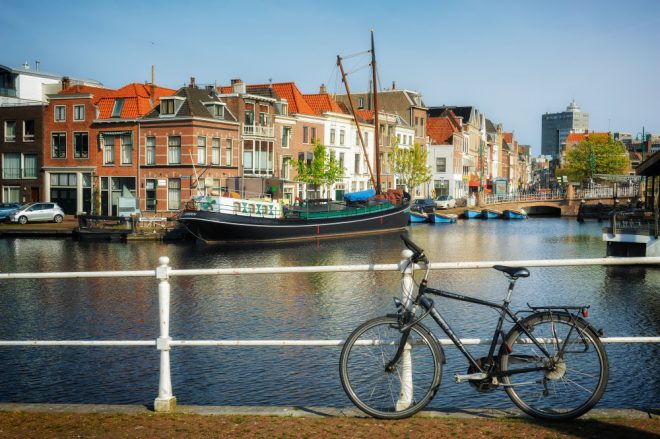
Most people I meet who have traveled to the Netherlands have only been to Amsterdam. And although Amsterdam is a beautiful city, the Netherlands has a lot more to offer!
Leiden is where I was born and raised. And I know, that might make me biased, but most Dutch people will agree: Leiden is a beautiful city with a rich history.
“It’s Amsterdam without the masses of tourists, and with the charm of a small city”
With its well-maintained historic center, extensive network of canals, and pretty cobblestone streets, Leiden might remind you of Amsterdam a bit. But it’s Amsterdam without the masses of tourists, and with the charm of a small city, easily explored on foot or by bicycle.
Leiden is almost like a life-size museum with historic university buildings, traditional windmills, fortifications, and impressive churches all within walking distance from each other.
Tip: Leiden is a perfect day trip from Amsterdam. By train it only takes you 30 minutes to get from the center of Amsterdam to the center of Leiden.
With 13 museums within walking distance of each other, Leiden is often nicknamed the Dutch capital city of museums – although Amsterdam does have more museums, they’re spread out over a much larger area. Whether you’re into art, history, dinosaurs, or human anatomy, you’ll find a museum that fits your interests in Leiden.
Even if you aren’t into museums, Leiden still is a city well worth visiting. Just walk around the city center, stop for a drink or a bite to eat along one of the canals, take a picture of the De Valk windmill right in the city center, and enjoy a traditional Dutch market on Wednesdays and Saturdays.
Check out Leiden’s lively shopping streets or book a boat trip along the canals. If you’re looking to do something more active, go on a paddle boarding tour through the canals, which I did recently and can highly recommend! And if you love botanical gardens, don’t miss the Hortus Botanicus, which is the oldest botanical gardens in the Netherlands.
Lille, France
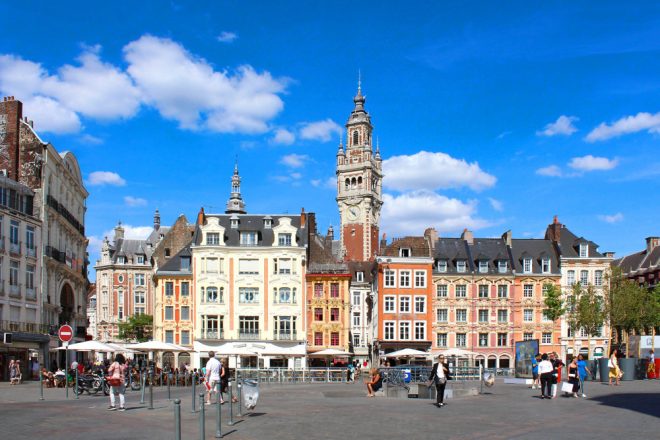
The city of Lille, France is an incredible place to visit. Its charming “Old Town” caters to those traveling through the city on foot with its cobblestone streets, while cars are confined to little lanes. The architecture there is stunning and carries a Belgian influence. Most bars and restaurants provide an outdoor terrace on the street, creating a special atmosphere.
“The architecture there is stunning and carries a Belgian influence.”
In Lille and the surrounding areas, there are a variety of museum types including art, history, old hospitals, and former homes just to name a few. Every first Sunday of the month there are free entrances. The “Garre Saint Silver” often offers unique exhibits and festivals throughout the year without charge.
It may not sound exciting at first, but it’s worth checking out the Old Stock Exchange. Inside you’ll find vendors selling all sorts of unique items including old magazines, posters, books and antiques. It’s a beautiful building and a great place to browse around. There are plenty of opportunities for some shopping in the city, both in the boutiques on the streets, as well as the at Euralille, the city’s shopping complex.
On the weekends, you can often find events going on. Lille has numerous acclaimed annual events as well, like The Braderie and the Christmas Market. There’s a main strip of bars and clubs that are open through the late hours of the night for those in search of nightlife. When in doubt, the Lille Tourism website is a lifesaver in finding up-to-date calendar events going on.
I loved spending time at the citadel. At the centre is the military base, but people can walk around the walls of the old citadel which are shaped like a star. There is also a very nice park nearby which connects to both the Zoo and a children’s amusement park.
The metro and the buses make it super convenient to travel throughout the newer parts of the city, as well as to some of the surrounding towns. I’m thankful for the buses, trains and the nearby airport, which make it an easy destination to travel to. Lille is a beautiful city which holds a dear place in my heart.
PS Try the vanilla waffles from Méert. They are life changing!
Faroe Islands
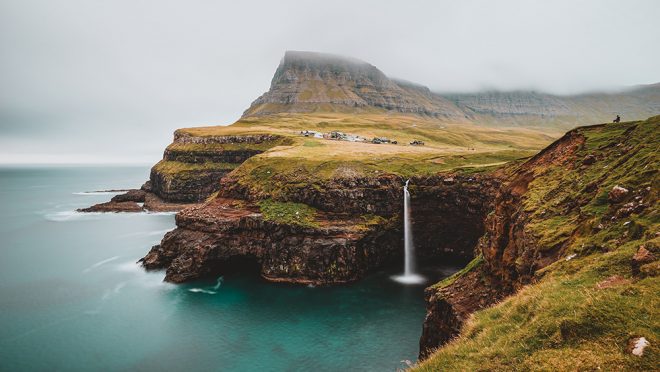
When it comes to my most adventurous trip to date, it has to be to The Faroe Islands back in 2016. As islands go, The Faroe Islands are less than conventional, and offer visitors the chance to experience raw nature within its 18 rocky, volcanic islands between Iceland and Norway.
“A chance to experience raw nature within its 18 rocky, volcanic islands between Iceland and Norway”
The self-governing archipelago is located in the North Atlantic Ocean, but is connected by road tunnels, ferries, causeways and bridges in order to access the various islands. The Faroe Islands are best known for their outdoor pursuits, and every year hundreds of hikers, naturalists and bird-watchers are drawn to the islands’ to uncover a country which is lesser known to the average traveller.
The Faroe Islands offer mountains, valleys, heathland, and steep coastal cliffs that harbour thousands of seabirds throughout the seasons. The wealth of animals on the island is outstanding, and some of the best and most wild I’ve ever seen. The island only has a population of 50,000, so you’re more likely to see an animal than you are a person whilst you are travelling around these islands.
The islands may be isolated, rainy and windy, but their perception of life is one to be admired, with a positive outlook and happiness score which outnumber many other countries around the world. The food is also amazing so make sure you check out some of the beautiful cafes in Tórshavn, including Brell Café!
The Faroe Islands offer an amazing unique experience to all visitors, which can leave you feeling fulfilled and happy. I would 100% add The Faroe Islands to your bucket list – you’ll have a holiday to remember forever.
Marseille, France
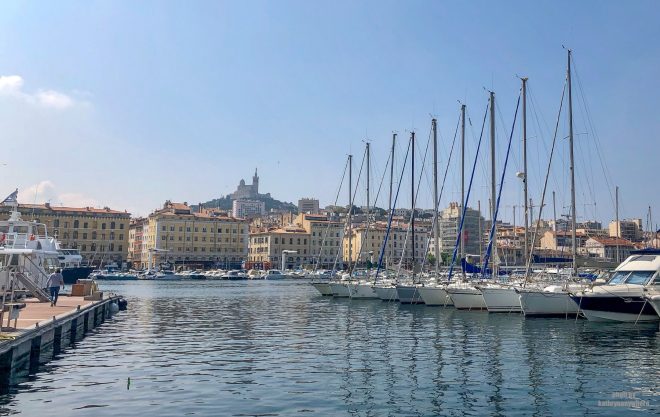
When my daughter and I were planning our three week trip to Europe, I was using Marseille as a location to stop, relax, and do laundry for my kids. I had chosen Marseille almost solely because of where it was located: South of France. That, and a major train station in the city that had a direct line from Barcelona. I figured my kids would be tired after a week of traveling and would be looking for a place to relax for a couple days before we picked up the pace again in Cannes.
To me, it looked like it would be a quiet, scenic place in the south of France to recharge after running through the action packed areas of Lisbon and Barcelona. We would probably just watch some boats go by while eating ice cream.
“I didn’t realize what an amazing and beautiful city Marseille was and how much there was to do there”
What I didn’t realize is what an amazing and beautiful city Marseille was and how much there was to do there! It seems to have a bad reputation as edgy and not tourist friendly, but I disagree.
Since we only had a day and a half in Marseille to really see as much as we could, we travelled to Notre Dame de la Gard. It’s the most visited site in Marseille and I can definitely see why. The exterior of the church is an architectural marvel. While we did not enter inside, the basilica is said to be stunning.
After wandering into a local soap shop (Marseille is famous for it’s soap) and having the best pizza we could ever ask for at a restaurant in the Vieux Port area (did you know Marseille is world renown for its gastronomy?), we managed to fit in a visit to The Museum of European and Mediterranean Civilisations. In the gift shop on the main floor is a library-like set up where the kids have an opportunity to sit and read. There were a few books in English for them, but they enjoyed looking at the French books too.
And in the Vieux Port area? There are always street performers, we found a ton of entertainment, and every restaurant we tried was a hit.
Some links may be affiliate links, meaning I may earn commission from products or services I recommend. For more, see site policies.
Source https://www.eduopinions.com/blog/where-to-study/top-5-countries-europe-get-job
Source https://ec.europa.eu/info/strategy/priorities-2019-2024/promoting-our-european-way-life/statistics-migration-europe_en
Source https://www.indietraveller.co/europe-alternative-destinations/